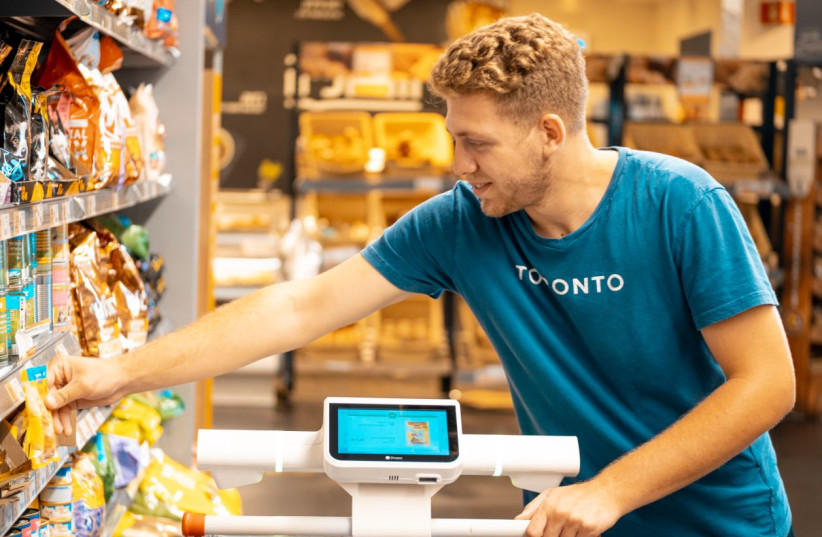There’s a growing technology industry hinged on artificial intelligence that aims to improve the entire experience of buying your weekly staples, holiday gifts and guilty purchases, both for shoppers and stores.
There are many potential use-cases for AI in the commerce sector, both in physical brick-and-mortar stores and e-commerce shop fronts. Regarding the former, Tel Aviv-based smart-cart company Shopic is developing innovative ways to interact with physical supermarkets, by way of their AI-powered device that clips onto preexisting shopping carts.
Using computer vision technology, Shopic’s clip-on device recognizes items placed in or taken out of the cart in real time, automatically registering them by price and displaying the shopper’s active receipt on the device’s screen.
Shopic personalizes the in-store experience by offering digital promotions based on consumers’ previous buying habits, store location and item selection in real time, in theory saving them time and money.
Additionally, customers can load their carts and walk straight out the front door of the store, paying via the device and bypassing the checkout line entirely. This same technology can be seen in competing Israeli smart-carts, such as WalkOut, which recently signed an extensive cooperation agreement with Machsanei Hashuk, one of the largest supermarket chains in Israel.
For retailers, Shopic’s analytics engine optimizes store management with real-time tracking of shopping carts and store shelves, which gives a much more robust set of analytics of their shoppers’ in-store journeys. This data can be used for footpath personalization, contextual promotions and a better understanding of shopping habits.
“After spending a ton of resources in developing online strategies, grocers now witness e-commerce giants, led by Amazon, entering brick-and-mortar stores,” said Raz Golan, Shopic’s co-founder and CEO.
The utility of AI isn’t limited to physical establishments, though.
“Traditionally, the consumer experience existed in the retail store,” said Guy Bloch, CEO of Bringg, a platform that uses automation and data analytics to connect retail supply chain systems, delivery fleets and customers. “The fast move to online created a shift in not only consumer behavior but also brand behavior.”
As a result of that fast move, a host of start-ups are working to make the shopping experience as frictionless as possible.
“Today, most online consumers are millennials and Gen Z, and these generations demand a personalized and streamlined shopping process, and will no longer accept a messy and tiring purchase journey,” explained Jonathan Friedman, co-founder and CEO of Karma, which uses AI technology to allow its online community to shop smarter by automating the shopping journey.
The true viability of the AI shopping sector has yet to be truly tested, but the companies that are getting in on the ground floor see a budding market with great potential.
“Both traditional and online players [are shifting] to hybrid experiences that apply the best in online shopping – high transparency and personalization with very little friction – in physical retail spaces,” stated Golan. “AI is going to be a key success factor for these initiatives.”


